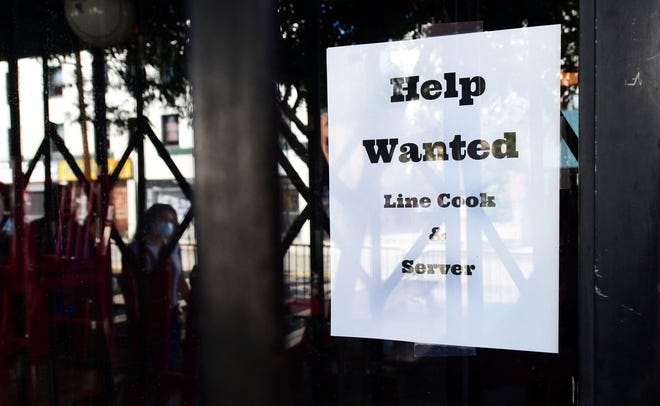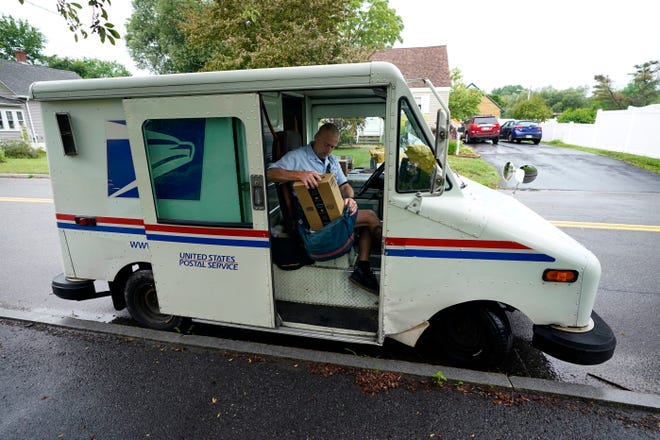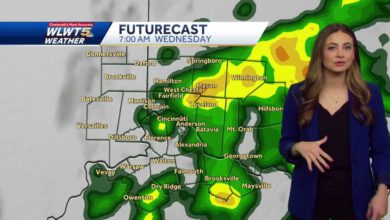
U.S. hiring surged again last month as the economy continued to reopen, with employers adding 943,000 jobs despite a spike in COVID-19 cases as persistent worker shortages appeared to ease.
The unemployment rate, which is calculated from a different survey of households, tumbled from 5.9% to 5.4%, the Labor Department said Friday.
The job gain, the largest since August 2020, topped the 900,000 projected by economists surveyed by Bloomberg.
So far, the U.S. has recovered 16.7 million, or 74%, of the 22.4 million jobs lost last spring, leaving the nation 5.7 million jobs below its pre-pandemic level.
Leisure and hospitality, the industry hit hardest by the pandemic, again led the advances, adding 380,000 jobs, including 253,000 at restaurants and bars, as more states ended capacity limits.
Local, state and private education added 261,000 jobs but for the second straight month those advances represented an oddity of Labor’s seasonal adjustments. School employees typically come off payrolls in June and July. But since fewer education workers are employed because of the pandemic, fewer dropped off and that translated into a big gain after seasonal adjustments.
Professional and business services added 60,000 jobs; transportation and warehousing, 50,000; and health care, 37,000. Manufacturing added 27,000 jobs despite longstanding supply-chain bottlenecks set off by the pandemic.
The number of Americans on temporary layoff declined sharply by 572,000 to 1.2 million as restaurants and stores recalled more furloughed workers amid the lifting of business constraints and surging customer demand. The figure is down from 18 million in the early days of the pandemic. About 14% of unemployed workers said they were on temporary layoff, down from 19% the previous month. That means there’s still room for further gains, though it's narrowing.
The ranks of Americans permanently laid off fell by 257,000 to 2.9 million.
The economy is reaping the benefits of a massive spending binge by consumers flush with stimulus money just as states have lifted business constraints.
At the same time, fueled by the delta variant, daily new COVID-19 cases have risen about sevenfold since mid-June to about 90,000 after falling steadily the first half of the year. The July report, however, was likely conducted too early to capture the effects of the leap in cases.
In the months ahead, "The Delta variant does pose a risk to the pace of progress," said Nick Bunker, economic research director for job site Indeed.
About 60% of the adult population is fully vaccinated, but new daily vaccinations have slowed in recent months, according to the Centers for Disease Control and Prevention. And the South and West are grappling with relatively low vaccination and high infection rates.
Most leading economists don’t expect the COVID spikes to significantly dent their forecasts for historically strong job and economic growth this year, largely because states, at least so far, haven’t reinstated business restrictions.
A big wild card is how quickly worker shortages that have crimped payroll gains will ease. Goldman Sachs says continuing unemployment insurance claims -- which roughly represent the number of people still laid off – fell sharply last month in the 26 states that cut off a federal bonus early. The rest of the states are set to phase out the enhanced benefits by September, likely prompting many more Americans to look for jobs and accept offers.
But economist Lydia Boussour of Oxford Economics says “early evidence points to a minimal impact from the expiration of benefits thus far.”
The reopening of more schools in September also should lead many parents who have been caring for their distance-learning kids to return to the labor force. The delta variant, however, could keep some workers at home, Boussour says.
Despite the question marks, Oxford continues to expect record gains of about 8 million jobs this year.
Some other indicators pointed to sluggish job gains last month. Homebase, which provides payroll software to small businesses, says the number of employees working dipped 0.4% in July. And payroll processor ADP said the private sector added just 330,000 jobs, well below estimates.

Source link








